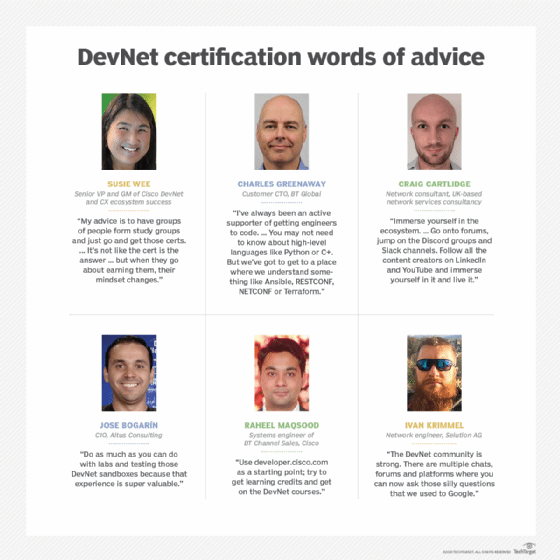
svetazi - stock.adobe.com
Network pros share Cisco DevNet certification advice
Cisco DevNet certifications require a lot of time investment, but network pros who pursue the certifications say the gained skills and knowledge are worth it.
IT professionals have long pursued certifications as a tangible way to prove expertise in a certain field or niche. In the networking world, specifically, Cisco certifications have arguably been the most recognizable and coveted certs.
In 2020, Cisco revamped its certifications to align them with technology and concepts that have moved into mainstream networking. The new DevNet certification track, for example, highlights network automation, programmability and software. Since the track launched in February, more than 6,000 people have achieved DevNet certification, according to Susie Wee, senior vice president and general manager of Cisco DevNet and CX ecosystem success.
With such a large number of participants, network pros clearly deem DevNet concepts as a worthy endeavor, even as traditional knowledge of network design and protocols remains crucial.
Why get a Cisco DevNet certification?
Charles Greenaway, customer CTO at BT Global, was in the first batch of 500 people to go for a Cisco DevNet certification, passing the Associate exam in March 2020. For Greenaway, the DevNet certification enabled him and his telecom company to stay competitive by using smarter automation processes.
While basic networking principles remain the same, the method of implementation has shifted toward API-driven networks, Greenaway said. By better understanding how to interact with those APIs, he said he can assess customers' deployments more quickly, looking for configuration errors and monitoring state at a deeper level.
The ability to automate configuration tasks, use telemetry for richer insights into network environments and manage networks at scale were common benefits among other network pros who sought DevNet certifications.
Ivan Krimmel, network engineer at Selution AG, an information and communications technology firm based in Switzerland, passed the DevNet Associate exam the day the track launched in February. He then completed the Data Center Automation, Enterprise Automation and Core exams in the following months. Krimmel has used his new skills to diversify his networking knowledge and dig deeper into telemetry, using automation to customize network requirements for customers.
For Craig Cartlidge, network consultant at a U.K.-based network services consultancy, DevNet covered engaging concepts that would create business value and enable him to focus on more important aspects of network engineering, like delivering new services into the infrastructure. As he grew more familiar with automation, he recognized its benefits for continuous integration/continuous delivery (CI/CD) and continuous deployment in network validation and testing. Ideally, he said, network infrastructure will evolve and live in a CI/CD pipeline to create a continuous lifecycle, reducing downtime and opening opportunities for network pros to work on other tasks.
The value of automation to free up time for innovation was also a compelling benefit for Jose Bogarín, CIO at Altus Consulting. Bogarín passed five DevNet exams in March and May 2020 -- Associate, Enterprise Automation, Collaboration Automation, Webex and Core -- and is currently studying for three more DevNet specializations by the end of the year. With automation skills, network engineers have an extra tool to simplify their daily activities, spending more time on the tasks they enjoy, he said.

Software development: From obstacle to asset
As networking evolves, so too do network roles and interactions with developer teams. While Wee stressed that network architects don't need to become coders, she said they must be able to communicate with coders in a language that incorporates developer concepts, such as Ansible, CI/CD, DevOps and GitHub. Once those concepts become part of their vocabulary, network pros can better architect and solve problems for mission-critical situations, she added.
Greenaway agreed, maintaining that network pros should know how to code basic runbook automation. While high-level languages, like Python or C+, aren't always necessary, it's beneficial for network folks to understand Ansible, RESTCONF, NETCONF or Terraform, he said.
But this transition requires a purposeful shift in mindset, culture and even career goals. For years, the Cisco Certified Internetwork Expert (CCIE) certification has been the most prestigious achievement in networking, said Raheel Maqsood, systems engineer of BT Channel Sales at Cisco, who passed the DevNet Associate exam in the fall and is now preparing for the DevNet Specialization in DevOps. Network pros may change their priorities as they consider DevNet certification to bridge the gap between networking and software development, he said.
Krimmel had similar sentiments, suggesting that networking newcomers should pursue the DevNet Associate exam right after the Cisco Certified Network Associate exam. While some of the more advanced skills in CCIE or Cisco Certified Network Professional exams may not transfer to every networking job, automation is useful for almost any network environment, he said.
Cartlidge is one network pro who saw his expected trajectory toward a CCIE certification shift to focus on automation and programming. He had gone into networking specifically to avoid software engineering but realized he needed to invest in those skills as networking evolved. Although his first encounter with Python made him wonder if he'd ever understand it, he said he decided to embrace the challenge rather than run away from it. In May 2020, he passed the Associate exam.
"The biggest high point is when it all clicks, when you can engage with someone who's not even from networking -- like a software developer -- and talk with him. Before that, knowledge was siloed," Cartlidge said.
Each network pro emphasized how learning DevNet concepts gave them the ability and confidence to work with developer teams. But it also proved to be one of the biggest challenges to overcome. Bogarín acknowledged the transition can seem intimidating because networking people typically don't like to do software development, and Krimmel said he sometimes found the process of learning software concepts depressing and mentally taxing.
But both Bogarín and Krimmel said learning software development enabled them to become a bridge between networking and developer teams.
"Now, at my customers, I can speak to DevOps folks and server teams because I learned this interface of how they interact with their tools," Krimmel said.
Cisco DevNet certification tracks
- DevNet Associate
- DevNet Specialist
- Focus areas: Core, DevOps, IoT, Webex, Collaboration Automation, Data Center Automation, Enterprise Automation, Security Automation and Service Provider Automation
- DevNet Professional
- DevNet Expert
Cisco DevNet certification advice for studying
To succeed in the DevNet journey, network pros said support from the DevNet community, time investment and hands-on experience were crucial.
Nick Russo, technical leader at Cisco, passed five Cisco DevNet exams in 2020, sharing his experience in his blog and guest posts. When writing about the DevNet Professional Core (DEVCOR) exam, Russo was clear about the importance of having the proper amount of experience.
"The DEVCOR exam was no joke. … I suggest you take the '3 years experience' requirement seriously. I have a Computer Science degree along with about 3 years of full-time network automation experience. I also teach these topics professionally, yet I still found the exam challenging," Russo wrote in a guest post on Daniels Networking Blog.
So, how can DevNet hopefuls prepare for the exams and develop the necessary skills? For Greenaway, Bogarín and Maqsood, applying the concepts they were learning to real-world problems that emerged in their daily jobs was a valuable learning method. The DevNet track does a better job of addressing how technology can solve problems, Bogarín said, especially compared with other Cisco exams that test about specific product versions rather than the theory behind them.
Study materials for DevNet exams
These resources were common favorites among the network pros:
- Cisco sandboxes
- Nick Russo's Pluralsight DevNet course
- Network Programmability and Automation: Skills for the Next-Generation Network Engineer by Jason Edelman, Scott Lowe and Matt Oswalt
- ITProTV's DevNet Associate episode
- Mastering Python Networking by Eric Chou
- David Bombal's Udemy Net DevOps course
- CBT Nuggets' DevNet online training
Compiling DevNet study material was the hardest part of the exam process among the network pros. While numerous materials are available now, finding legitimate resources can still be tedious. Ultimately, each network pro advised people to use the free training material available from Cisco and the DevNet community. Cisco, for example, provides a DevNet sandbox where users can work with almost any Cisco technology and apply what they're learning.
"Immerse yourself in the ecosystem," Cartlidge said. "If it's a totally new world, you need to embrace the community. Go onto forums; jump on the Discord groups and Slack channels. Follow all the content creators on LinkedIn and YouTube, and immerse yourself in it, and live it."
As more people decide to pursue DevNet certifications, Wee has seen how mindsets change when people start applying the skills they learn. While she used to think the value of DevNet was teaching people the skill sets and letting them use APIs, she said she gradually realized that was only a piece of it.
"The main thing is they then start innovating and thinking differently," Wee said. "They start working together and bringing others along."






